“Can you have sausage?”
“No.”
Despite always enjoying the food my parents cooked, I had not had enough patience when I was younger to actually learn how to prepare much more than pasta and burgers. Now that I was going to be moving back to Louisiana, I wanted to learn our Cajun recipes to be able to share with the people I’d be meeting. But, as we stood in the kitchen, going over the list of ingredients we’d need to buy, my mom’s question disheartened me. Sausage was vital to the taste of our gumbo, and it was also treyf.
“What if it’s beef sausage?”
“Then yes.”
I appreciate my parents’ help in making our family recipes kosher. Until now, there’s been no reason for them to tweak these recipes – except to accommodate the spice tolerance of guests – but with my conversion to Judaism, I have taken on many of the dietary laws. Making certain dishes kosher has been one of the most fulfilling ways I’ve been able to combine my identities as a Jew and as a Cajun. Saying hamotzi over bread and gumbo perfectly sums up what I feel are the two most important identities I hold.
But they often don’t fit neatly together.
When it comes to food, for example, I am lucky that there are ways to make many staples kosher, but some are simply impossible. I can’t have alligator or catfish or crawfish. It’s not that I necessarily crave these foods – there are other foods I gave up when I started eating kosher that I enjoyed a lot more – but that rejecting them feels like I’m rejecting a part of myself. I am choosing Judaism over being Cajun. I would feel just as bad the opposite way. No matter what, it feels like I am saying one is more important than the other.
Food isn’t the only place where this becomes an issue.
When reading stories from the Torah, I often find myself relating them to Cajun history and the current struggle against culture loss and assimilation. I know that people interpret these stories in different ways to relate to many modern day issues, but I can’t help but fear that it means Judaism isn’t important enough to me. It’s a fear every convert goes through, whether they struggle to believe in G-d the way they think they should, they aren’t as observant as Jews they’ve met, or some aspects of Judaism don’t resonate as strongly for them. It’s a baseless fear – everyone will tell you there’s not one right way to be Jewish – but I still find myself struggling between how I view these stories and how I feel I should be viewing these stories.
I should appreciate how Esther risked her safety to save the Jewish people – and I do – but I am far more interested in how Mordecai’s refusal to bow before Haman and the resulting fallout resembles the forcible deportation of the Acadians following their refusal to pledge allegiance to the British Crown.
Joseph was sent to a foreign land, yet, with G-d’s help, prospered. The Acadians were forcibly deported from their home in Acadia – modern day Nova Scotia – and ended up in the swamps of Louisiana, where they made a name for themselves as Cajuns. I can’t help but excitedly wonder if there will be an Exodus of sorts; some series of events that help Cajuns reclaim their culture from the commercialization and assimilation of the last century.
Are comparisons another method of merging salient identities, like making Cajun recipes kosher, or am I choosing my Cajun identity over my Jewish one? Should these stories make me think about G-d more? Should I appreciate them on the basis that I am Jewish, separate from my other identities? I don’t know how I could do that. I don’t know how to celebrate the pride I have in one identity without detracting from the other.
I have no Jewish heritage. My conversion was, of course, more than just a change of religion; it was an adoption into a people. Jewish history is my history, but it is not the history of my family. I am Jewish, but it is difficult to imagine that the history of the Jews is one I can claim. My conversion was finalized recently, so I am sure with time I will get more comfortable positioning myself in that narrative, but for now I can still relate to Jewish history through the history of the culture I grew up with. The instances of exile, forced assimilation, and generational trauma the Jewish people have gone through is not a history that I truly feel comfortable claiming yet. I know how important these histories are, because although I wasn’t raised Jewish, I was raised with similar narratives.
When I talk to people who are learning Yiddish because their grandparents didn’t pass it down to them, I think of Louisiana French. Whether our ancestors were forced to stop using the language for their own safety, or didn’t pass it on so their descendants could assimilate into broader society, the effects of language loss are the same for Cajuns, Jews, and anyone whose heritage language is lost or endangered: it’s like a part of us is missing.
While my friends struggle through Yiddish Duolingo units, I’m right beside them, mimicking the speech of a French-speaking Cajun on Youtube. Language loss isn’t the only connection. In discussions about Jews and ethnic or racial labels, such as the “conditional whiteness” afforded Jews of European descent, I see connections to how broader American society changed the definition of “Creole.” I have seen how negative stereotypes affected my family members’ comfort in labeling themselves as anything other than American.
Am I detracting from the real conversations that need to be had about Jewish history and politics by bringing in experiences from the culture I was raised in? Or do my experiences add a valuable perspective?
As I continue to embrace Judaism, I hope that reconciling these identities will become easier. As a recent convert, it is easy to spiral, wondering whether I am doing Judaism wrong, or not doing enough. I want my Jewish and Cajun identities to coexist neatly, but that’s not how identity works. It can’t be packed into a box and put in a row. Between my cultural identities, there will be differences and similarities and moments when I have to choose what’s more important to me. I am comforted by knowing I’m not alone: others have struggled with this, and figured out what works for them. I know with time I will, too.
Until then, there are things I can do to acknowledge and celebrate both parts of myself. Like making kosher Cajun dishes, or in choosing my Hebrew name, Yosef Shoshan ben Avraham v’Sarah. Yosef, for Joseph, whose story is so important to the foundation of Judaism. It is a story that I find closely parallels that of the Cajuns. Shoshan, lily, for the fleur-de-lis so synonymous with Louisiana. Ben Avraham v’Sarah, son of Abraham and Sarah, weaving me into the history of the Jewish people.

